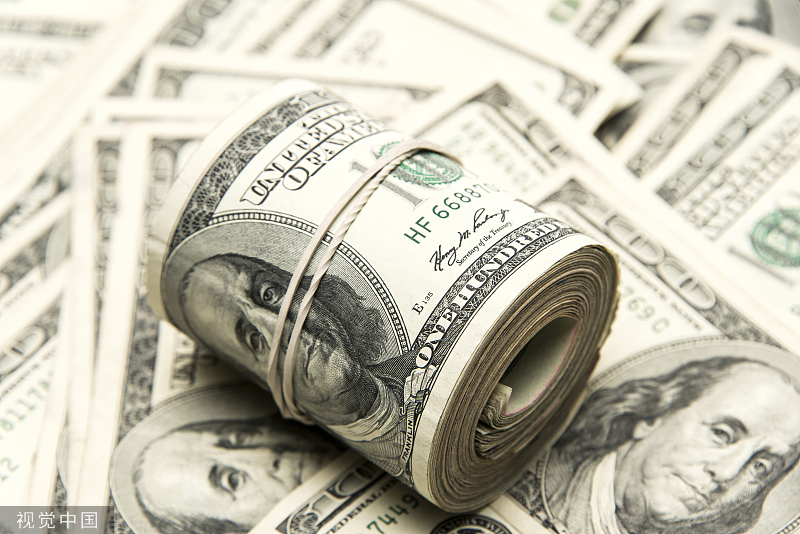US dollar's influence seen eroding


One of the byproducts of the ongoing political division in the world has been a gradual shift away from the US dollar, the dominant currency in international trade.
Pessimism about the dollar's path also has been expressed by prominent people in the United States.
"Our currency is crashing and will soon no longer be the world's standard, which will be our greatest defeat, frankly, in 200 years," said former US president Donald Trump in a speech on April 4, the day he was indicted by a New York City grand jury over a hush money payment. "There will be no defeat like that. That will take us away from being even a great power."
On March 29, billionaire Elon Musk, CEO of Tesla and Twitter, in response to a tweet skeptical about the dollar retaining world currency reserve status, wrote: "Serious issue. US policy has been too heavy-handed, making countries want to ditch the dollar."
Musk wrote that the situation was worsened by "excess government spending, which forces other countries to absorb a significant part of our inflation".
On March 31, Brazil and China agreed to use their own currencies when settling financial transactions.
The Chinese yuan also has replaced the dollar as the most traded currency in Russia, a result of a slew of Western sanctions against Moscow, bloomberg.com reported on April 3.
Robert F. Kennedy Jr, a scion of America's most storied political dynasty, has concluded that the US strategy to maintain global hegemony through military power has failed.
"The collapse of US influence over Saudi Arabia and the Kingdom's new alliances with China and Iran are painful emblems of the abject failure of the Neocon (neoconservative) strategy of maintaining US global hegemony with aggressive projections of military power," Kennedy, nephew of the late president John F. Kennedy, wrote on Twitter on April 3.
"China has displaced the American Empire by deftly projecting, instead, economic power. Over the past decade, our country has spent trillions bombing roads, ports, bridges, and airports," wrote Kennedy, who plans to seek the Democratic nomination for president in 2024.
"China spent the equivalent building the same across the developing world," he wrote. "The Ukraine war is the final collapse of the (neocons') short-lived 'American Century.'"
Kennedy said that US military involvement in Iraq and now Ukraine has cost $8.1 trillion and "hollowed out our middle class, made a laughingstock of US military power and moral authority, pushed China and Russia into an invincible alliance, destroyed the dollar as the global currency, cost millions of lives and done nothing to advance democracy or win friendships or influence".
French President Emmanuel Macron, in an interview with Politico published Sunday, said Europe needs to reduce its dependence on the "extraterritoriality" of the dollar.
The move away from the dollar has gained momentum since the start of the Russia-Ukraine military conflict.
Alexander Babakov, deputy chairman of the Duma, said that the BRICS (Brazil, Russia, India, China and South Africa) nations are poised to create a new payments system.
Western governments froze $300 billion of Russia's foreign currency reserves last year and removed Russian banks from the SWIFT international payments system.
"The so-called dollar 'weaponization' has rattled many countries and not just Russia," said Jason Hollands, managing director of Bestinvest, reported firstpost.com, a website in Mumbai, India. "Countries willing to continue to trade with Russia, like India and China, have started doing so in rupees and yuan instead, triggering talk of the de-dollarization of the international trading order."
The US dollar became the official reserve currency of the world in 1944 at a gathering by 44 Allied nations in New Hampshire known as the Bretton Woods Agreement.
Since then, the dollar has given the US an inordinate amount of influence over other economies, and Washington has long used economic sanctions to achieve foreign policy goals.
The dollar's share of global foreign-exchange reserves dropped below 60 percent in the fourth quarter of 2022, according to the International Monetary Fund's Currency Composition of Official Foreign Exchange Reserves.
"China has already helped launch the Asian Infrastructure Investment Bank (AIIB) as an alternative to the World Bank within the Asian region. If it can indeed tackle the influence of the World Bank and IMF within the region, it might be possible for the yuan to become competitive against the US dollar in the long run," Dr MM Akash, chairman of the Department of Economics at the University of Dhaka, told The Business Standard.
In 2014, the BRICS nations formed a $50 billion New Development Bank as an alternative to the World Bank and the IMF. They also established a joint liquidity reserve to ensure that members could meet debt repayments.
As for the BRICS' potential currency, it could happen as soon as August, when the member countries meet at their annual summit in South Africa.
"New Delhi, Beijing and Moscow are the nations that now institute a multipolar world that is endorsed by the majority of governments," Babakov said.
The dollar comprised 69 percent of global currency reserve holdings in 2007, according to The Daily Telegraph in Australia. The yuan, or renminbi, advanced to the fourth position in the international payments market earlier this year, behind the dollar, the euro and the yen. In 2010, the yuan was ranked 35th.
"(China) has expanded access to more foreign financial institutions through the Belt and Road Initiative and the expansion of offshore yuan transaction centers," said University of Pretoria economics professor Elsabe Loots, reported news.com in Australia. "This, in turn, has boosted the yuan's role in trade and financial transactions as well as its role as a reserve currency.
"As the world becomes more divided by this war (in Ukraine), the Chinese yuan may become the safe haven for Russia and other like-minded countries," she said.
Economist Nouriel Roubini wrote in the Financial Times in February that the US has taken steps that have reduced "the appeal of dollar assets among foes and relative friends".
"These include financial sanctions against its rivals, restrictions to inward investment in many national security-sensitive sectors and firms, and even secondary sanctions against friends who violate the primary ones," he said.
Meanwhile, Saudi Arabia, Iran, India and the United Arab Emirates have begun exploring alternatives to the US dollar for oil payments.
"The vast majority of energy (oil and gas) contracts are invoiced in US dollars, so energy prices typically move together with the US dollar," wrote Timo Henckel, senior lecturer in the Research School of Economics at the Australian National University, reported news.com.
"For energy-importing countries, this means that measured in their own currency, the adverse impact of higher energy prices is exacerbated by an appreciating US dollar," he said. "The US plainly has no interest in giving up its exorbitant privilege while no other nation currently has the means to become a monetary hegemon."
Reuters contributed to this story.






























